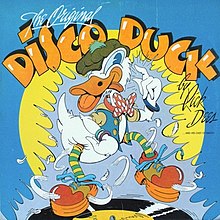The Original Disco Duck
Appearance
| The Original Disco Duck | |
|---|---|
 | |
| Studio album by Rick Dees and His Cast of Idiots | |
| Released | 1977 |
| Recorded | 1976 |
| Studio |
|
| Genre | Disco, novelty[1] |
| Length | 36:05 |
| Language | English |
| Label | RSO |
| Producer | Bobby Manuel |
The Original Disco Duck is the debut album by American DJ Rick Dees, released in 1977, and includes the hit single "Disco Duck".
Critical reception
[edit]The editorial board of AllMusic Guide gave this album four out of five stars, with reviewer JT Griffith calling it "a fun novelty record, but not a classic comedy album".[1] Rolling Stone gave the release one star out of five.[2] Billboard declared the album an "utterly inane disk that does not lack charm and merit".[3]
Record World said that the second single "Dis-Gorilla" was "every bit as outrageous [as 'Disco Duck'] and could be every bit the hit."[4] "Dis-Gorilla" did not repeat the success of "Disco Duck", only reaching #56 on the Billboard Hot 100.[5]
Track listing
[edit]- "Disco Duck (Part I Vocal)" (Rick Dees) – 3:10
- "Barely White (That'll Get It Baby)" (Dees and Bobby Manuel) – 3:45
- "Bionic Feet" (Dees and Manuel) – 3:12
- "Flick the Bick" (Dees and Manuel) – 4:54
- "Disco Duck (Part II Instrumental)" (Mark Blumberg, Manuel, and Lester Snell) – 3:03
- "Dis-Gorilla" (Shelly N. Fisher, Willie Hall, and Manuel) – 3:05
- "Doctor Disco" (Dees and Manuel) – 4:50
- "Bad Shark" (Earl Donelson, Filson Bryant Hawkes, Manuel, James McGehee, Snell, and Peter Vescovo) – 4:17
- "He Ate Too Many Jelly Donuts" (Dees) – 3:02
- "The Peanut Prance" (Dees, Margaret Kerr, and Manuel) – 2:47
Personnel
[edit]- Rick Dees – vocals
- Andy Black – recording
- Scott Blake – backing vocals
- Mark Blumberg – horn and string arrangements
- William Brown – backing vocals
- Diane Davis – backing vocals
- Helen Duncan – backing vocals and percussion
- Phyliss Duncan – backing vocals and percussion
- David Foster – ARP synthesizer
- Jay Grayden – ARP programming
- Ray Griffin – bass guitar
- Willie Hall – drums and percussion
- Susan Herr – art direction
- Jim Kirk – photography
- Johnny Lee – illustration
- Pat Lewis – backing vocals
- Bobby Manuel – lead and rhythm guitar, percussion, production
- Carl Marsh – backing vocals
- The Memphis Horns – horns
- Ben Cauley
- Lewis Collins, Jr.
- Charles Findley
- Jack Hale
- Dick Hyde
- J. J. Kelson, Jr.
- Andrew Love
- Don Menza
- James Mitchell
- The Memphis Symphony – strings
- Gimmer Nicholson – rhythm guitar and slide guitar
- Tom Nikosey – design and typography
- Larry Nix – mastering at Ardent Mastering, Memphis, Tennessee, United States
- Ken Pruitt – backing vocals
- Swain Schaeffer – piano
- Lester Snell – clavinet, electric piano, horn and string arrangements
- Moog-Winston Stewart – ARP programming
- Jerry "Joker" Thompson – assistant engineering
- Warren Wagner – recording and remixing at Hollywood Sound Recorders, Hollywood, California, United States
- Rose Williams – backing vocals
See also
[edit]References
[edit]- ^ a b Griffith, JT. "Rick Dees – The Original Disco Duck". AllMusic Guide. Retrieved November 24, 2022.
- ^ The New Rolling Stone Record Guide. Random House/Rolling Stone Press. p. 134. ISBN 9780394721071.
- ^ "Billboard's Top Album Picks". Billboard. Vol. 89, no. 5. Nielsen Business Media, Inc. p. 66. ISSN 0006-2510.
- ^ "Hits of the Week" (PDF). Record World. December 25, 1976. p. 1. Retrieved March 3, 2023.
- ^ "Billboard Hot 100" (PDF). Billboard. February 5, 1977. p. 72. Retrieved March 3, 2023.
External links
[edit]- Official website

- The Original Disco Duck at Discogs (list of releases)
- The Original Disco Duck at MusicBrainz (list of releases)
